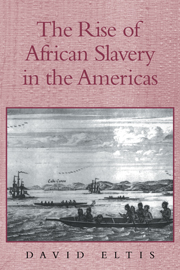Book contents
- Frontmatter
- Contents
- List of Tables
- List of Maps
- Preface
- Abbreviations
- Chapter 1 Slavery and Freedom in the Early Modern World
- Chapter 2 The English, the Dutch, and Transoceanic Migration
- Chapter 3 Europeans and African Slavery in the Americas
- Chapter 4 Gender and Slavery in the Early Modern Atlantic World
- Chapter 5 Productivity in the Slave Trade
- Chapter 6 Africa and Europe in the Early Modern Era
- Chapter 7 The African Impact on the Transatlantic Slave Trade
- Chapter 8 The English Plantation Americas in Comparative Perspective
- Chapter 9 Ethnicity in the Early Modern Atlantic World
- Chapter 10 Europe and the Atlantic Slave Systems
- Epilogue on Abolition
- Appendices
- A The Age and Sex of Africans in the Transatlantic Slave Trade, 1663–1713
- B Slave-Price Appendix
- C Merchandise Imported to West Africa, 1662–1713
- D Valuations of Produce Exports from the Leeward Islands in 1700
- Maps
- Sources and Bibliography
- Index
B - Slave-Price Appendix
Published online by Cambridge University Press: 05 August 2012
- Frontmatter
- Contents
- List of Tables
- List of Maps
- Preface
- Abbreviations
- Chapter 1 Slavery and Freedom in the Early Modern World
- Chapter 2 The English, the Dutch, and Transoceanic Migration
- Chapter 3 Europeans and African Slavery in the Americas
- Chapter 4 Gender and Slavery in the Early Modern Atlantic World
- Chapter 5 Productivity in the Slave Trade
- Chapter 6 Africa and Europe in the Early Modern Era
- Chapter 7 The African Impact on the Transatlantic Slave Trade
- Chapter 8 The English Plantation Americas in Comparative Perspective
- Chapter 9 Ethnicity in the Early Modern Atlantic World
- Chapter 10 Europe and the Atlantic Slave Systems
- Epilogue on Abolition
- Appendices
- A The Age and Sex of Africans in the Transatlantic Slave Trade, 1663–1713
- B Slave-Price Appendix
- C Merchandise Imported to West Africa, 1662–1713
- D Valuations of Produce Exports from the Leeward Islands in 1700
- Maps
- Sources and Bibliography
- Index
Summary
For the Americas, Galenson's series for Barbados, 1673 to 1711, is accepted without adjustment (no data for 1685). For 1663 and 1664, Galenson's unweighted mean prices for men, women, and boys are converted into a composite price for the average slave by calculating a weighted mean – the weights being set at the ratios of 4,393 men, women, and boys disembarked in Barbados in these years and contained in a separate data set. The ratios for 1663 are: men 0.422, women, 0.470, boys, .071, girls, 0.038; for 1664, they are 0.467, 0.443, 0.062, 0.028, respectively. The price of girls, not supplied by Galenson, is set equal to the price for boys. This procedure yields £13.89 sterling as the average slave price in Barbados for 1663 and £14.58 for 1664.
For Africa, the slave price series is derived from a register of merchandise sent to Africa compiled by a committee of the governing body of the Royal African Company, the Court of Assistants. This is contained in T70, volume 1222, and has been supplemented from other RAC sources. The registers typically provide a list of merchandise and an estimate of the number of slaves or quantities of other produce the merchandise would buy. The committee provided no breakdowns of sex and age of the slaves they expected to get. However, there were few children in these early years of the English slave trade; it was understood that while captains would seek men, they would end up taking almost as many women.
- Type
- Chapter
- Information
- The Rise of African Slavery in the Americas , pp. 293 - 298Publisher: Cambridge University PressPrint publication year: 1999



